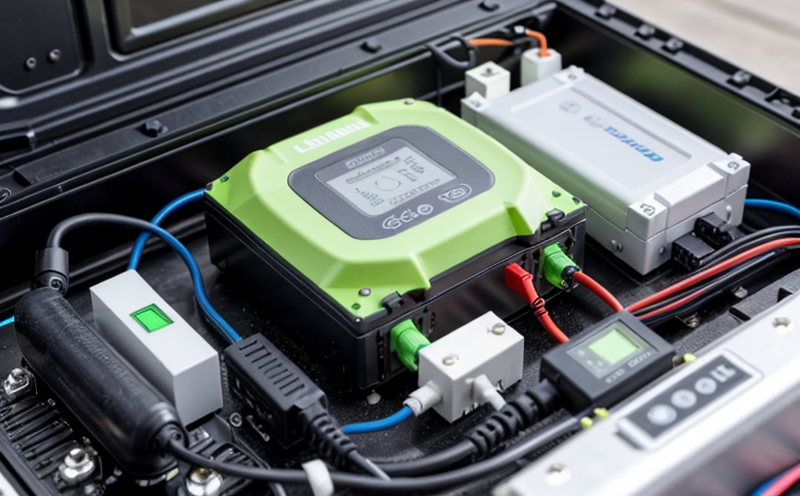NF EN 62619 Lithium-Ion Battery Testing for Industrial Applications
The European standard NF EN 62619 provides a framework for testing and certification of lithium-ion batteries used in industrial applications. This comprehensive set of guidelines ensures that these batteries meet the highest safety, performance, and reliability standards required by industry stakeholders.
Lithium-ion batteries are crucial components in various industrial sectors such as automotive, renewable energy storage, telecommunications, and consumer electronics. As their use expands, so does the importance of ensuring they perform reliably under a wide range of conditions. NF EN 62619 covers essential tests that evaluate battery integrity, thermal stability, electrical performance, and mechanical robustness. These tests are designed to simulate real-world operating environments and stress conditions.
One of the primary focuses of this standard is on ensuring that lithium-ion batteries do not pose a risk to human health or the environment during their lifecycle—from manufacturing through use and disposal. Tests include thermal abuse, electrical abuse, vibration testing, and more. Compliance with NF EN 62619 helps manufacturers meet regulatory requirements in Europe while also enhancing product quality.
The standard's scope encompasses both primary (non-rechargeable) and secondary (rechargeable) lithium-ion batteries used for industrial purposes. This includes batteries intended to power tools, vehicles, backup systems, and other applications where reliability is paramount. By adhering to this specification, manufacturers can ensure their products comply with international standards like ISO/IEC 61960-2.
Testing protocols within NF EN 62619 are detailed and precise, covering aspects such as charging behavior, discharge characteristics, internal resistance measurement, and more. The use of advanced instrumentation allows for accurate data collection and analysis, providing insights into potential areas for improvement or optimization.
| Test Type | Description |
|---|---|
| Thermal Abuse Test | Mimics accidental overheating scenarios by exposing the battery to elevated temperatures beyond its normal operating range. |
| Vibration Testing | Evaluates how well the battery withstands mechanical shocks and vibrations during transportation or installation. |
| Electrical Abuse Test | Assesses the battery's ability to handle overcharging, deep discharge, and short-circuiting without damage. |
| Cycling Capacity Test | Determines the number of charge-discharge cycles a battery can endure before its capacity falls below acceptable levels. |
Compliance with NF EN 62619 not only ensures safety but also enhances brand reputation and customer trust. It demonstrates a commitment to quality and reliability, which are critical factors in industrial markets where performance can directly impact operational efficiency and profitability.
- Maintains safety standards across the supply chain
- Ensures consistent product performance over time
- Fulfills regulatory requirements for European markets
- Promotes trust among end-users regarding long-term reliability
In summary, NF EN 62619 Lithium-Ion Battery Testing is essential for ensuring that industrial-grade lithium-ion batteries meet the highest safety and performance standards. By adhering to this standard, manufacturers can build confidence in their products' quality and durability.
Why It Matters
The implementation of NF EN 62619 Lithium-Ion Battery Testing is critical for several reasons:
- Safety Compliance: Ensures that batteries are safe from overheating, short circuits, and other hazards.
- Regulatory Requirements: Meets the stringent requirements set by European regulations to enter the market legally.
- Risk Mitigation: Reduces the risk of product recalls due to failures or malfunctions.
- Enhanced Reputation: Builds a strong reputation for quality and reliability, which can lead to increased customer trust.
In today's competitive market, compliance with international standards like NF EN 62619 is not just advisable but necessary. It provides a clear advantage over competitors who may not adhere to such stringent testing protocols.
Industry Applications
| Application Area | Description of Testing Needs |
|---|---|
| Automotive Industry | Battery packs for electric vehicles need to undergo rigorous testing to ensure they can withstand extreme temperatures and high power demands. |
| Renewable Energy Storage Systems | Energy storage systems require continuous performance under variable environmental conditions, necessitating thorough thermal and mechanical stress tests. |
| Telecommunications Infrastructure | Battery backup solutions must provide uninterrupted power during outages. Testing focuses on endurance and quick response times. |
| Consumer Electronics | Laptops, smartphones, and other portable devices need reliable batteries that can last through multiple charge cycles without degradation. |
- Battery Packs: Used in electric vehicles, solar power systems, uninterruptible power supplies (UPS), etc.
- Solar Power Systems: Ensures batteries can store and release energy efficiently over extended periods.
- Telecommunications: Provides backup during network outages to maintain service continuity.
- Consumer Electronics: Ensures devices remain functional through multiple use cycles without performance loss.
The diverse applications of lithium-ion batteries highlight the importance of NF EN 62619 compliance. Each application area has unique testing requirements that are addressed by this comprehensive standard.
Competitive Advantage and Market Impact
Adherence to NF EN 62619 Lithium-Ion Battery Testing offers numerous competitive advantages:
- Innovation Leadership: Demonstrates a commitment to continuous improvement and innovation.
- Increased Customer Confidence: Enhances trust among consumers and businesses who rely on reliable products.
- Better Product Lifecycle Management: Ensures longer-lasting batteries with reduced maintenance costs.
- Regulatory Compliance: Avoids potential fines and penalties associated with non-compliance.
In a highly regulated market, NF EN 62619 compliance is a key differentiator. Companies that meet these standards are better positioned to capture larger shares of the global lithium-ion battery market. This standard ensures consistent quality across all products, fostering trust and loyalty among customers.
Moreover, compliance with this European standard can open doors to new markets where strict safety and performance regulations apply. It also allows manufacturers to focus on product development rather than regulatory concerns, ultimately leading to more innovative solutions that meet evolving industry needs.





